Wonder Showzen
Wonder Showzen is a decade-old MTV show that should still be shown daily on terrestrial television. It should be shown in cinemas when films end. People should be forced to stand up during it. Wonder Showzen, to this day, is my favourite ever television programme. If you like it, we can be friends.
A gruesome pastiche of Sesame Street earnestness, Wonder Showzen revelled in discomfort. There were puppets, but they’d be so abusive that members of the public would attack them. There were children, but they were dressed up as dead popes. There were songs, but they were about the benefits of slavery. There were narrated field trips, almost always to abattoirs. And there were lessons, too. One episode taught the viewer patience, by spending the second half of the episode playing the first half in reverse. It wasn’t an easy watch by any standard.
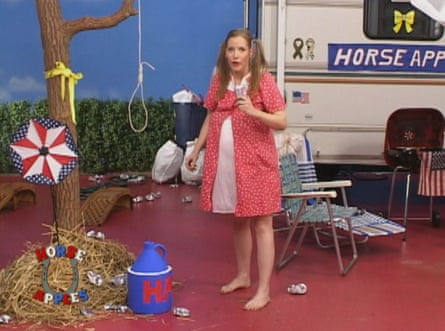
The greatest parts were its Beat Kids segments, where a roving child reporter mouthed memorised lines to appalled bystanders. “Who pays for this meat? I mean, spiritually?” they’d ask butchers. In one episode, a boy in a Hitler outfit walked up to a man in a 10-gallon hat and asked him which headgear represented the greatest form of oppression.
Traces of Wonder Showzen can still be found in web series like Don’t Hug Me I’m Scared – and co-creator Vernon Chapman has gone on to work on South Park, Jackass and Louis CK’s Horace and Pete – but it’s not the same. Wonder Showzen was always doomed to flame out early. But, god, it was like nothing else that’s ever been made. Daddy! Stuart Heritage
Due South
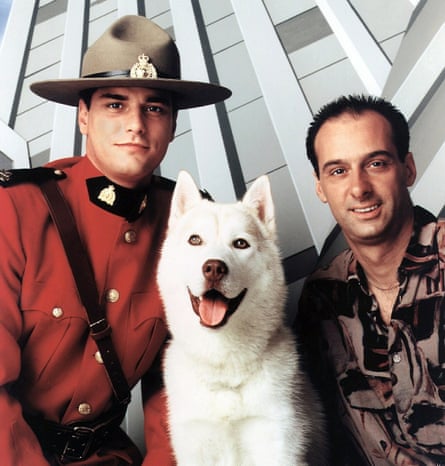
Due South had everything: immaculate writing, flawless acting and an ability to shift seamlessly from daft gags to high seriousness via moments of heartbreak and back again.
Creator Paul Haggis led us all on a joyous journey through the charming, funny, moving, deft and subtle world of hypercorrect Mountie Benton Fraser (Paul Gross, whose ridiculous handsomeness plus full set of both comedy and dramatic chops basically make him the ur-Jon Hamm). Fraser comes to Chicago on the trail of his father’s killers and stays – an innocent, honourable, compulsively honest fish-out-of-water – to partner for four seasons with cynical city police officer Ray Vecchio (David Marciano) and fight further crime.
It’s a roiling gallimaufry of styles, genres and moods; full of surreal moments. It shouldn’t work, but because of the talent involved, it does. It works like Twin Peaks works and should be spoken of with the same reverence and passion as David Lynch’s televisual masterpiece. Lucy Mangan
Top Gear
There are many good reasons for having a bad opinion of Top Gear. In the Clarkson version you could point to the casual xenophobia, the sexism, the climate scepticism, the stonewash denim and so on. In the aborted Chris Evans version, there was Chris Evans. And in both, producers had to struggle with the fact that talking about driving is like driving about architecture.
But to be hypnotised by the liberal-baiting and leather waistcoats would be to miss how well constructed Top Gear was – and still is. Super producer Andy Wilman may have left with his presenters for The Grand Tour, but enough of the muscle memory remains on the TG team to keep making hour after hour of effortlessly entertaining TV.
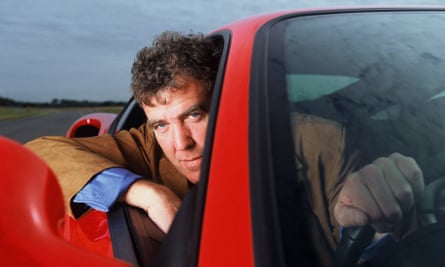
Yes, you spot the formula after a while: lingering pan across beautiful vista, nature’s domain disrupted by loud engine noise, brash middle-aged bloke appears, chuntering about 0-60 in 3.2 seconds, helicopter shot. So there’s the comfort of knowing what’s coming next, the trance-like state it can induce. But I also want to see how they’ve tweaked the formula this week, how Jeremy might be in the lead now but is guaranteed to lose, or quite how Eddie Jordan will cheat.
Beyond the star in the rallycross car segment which will surely not return next season, Top Gear doesn’t drag. That is no small feat for a programme heading into its 24th season. Paul MacInnes
Don’t Tell the Bride
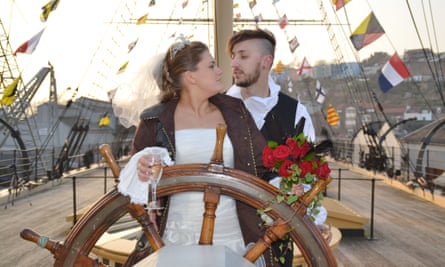
The conceit of Don’t Tell the Bride, where grooms are given a budget to plan their forthcoming wedding with no input from the bride, is, admittedly, pretty cliched – ooh, men and women, aren’t they different? Venus and Mars etc. But the show is far better than that, mainly because it approaches its subjects with genuine affection. It reminds me – like My Girl by Madness or Arctic Monkeys’ Mardy Bum –about the differences and frustrations any couple has to tolerate.
Most episodes follow a familiar storyline – the bride wants a meringue dress and a stately home. The groom takes all of the budget normally set aside for stately home hire and basic catering and spends it on hiring out Silverstone racing track with Formula 1 driver costumes for all the guests. (“But we met near Silverstone! You like to drive fast!”)
Rarely is there an episode in which the groom is not exposed as a complete buffoon at some point (the show doesn’t focus exclusively on straight couples, and if the gay marriage episodes prove anything, it’s that couples really don’t seem to know each other very well in any relationship).
Compared to its reality peers DTTB is the superior show because the stories that run parallel to the wedding blunders can be so poignant: blossoming relationships with step-parents; fall-outs with controlling friends; grooms sobbing on their best man’s shoulder when they realise they’ve ballsed it all up. These moments give emotional ballast to what would otherwise be an exercise in wackiness. Now if you’ll excuse me, I’ve got an anniversary to plan, and need to see if I can hire Anfield for the day … Tim Jonze
Treme
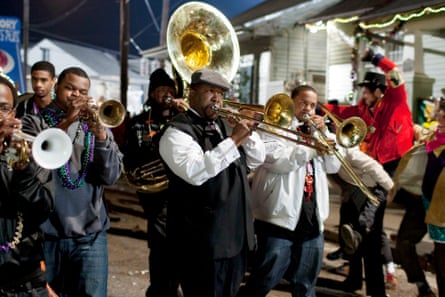
The Wire was never going to be an easy act to follow. David Simon’s move from the streets of Baltimore to New Orleans in the wake of Hurricane Katrina did not come without criticism. Some found it too plodding, some too preachy, others said it patronised the city abandoned by America. I found it slow-burn rather than slow, full of life that felt true and a stellar cast who made the script sing. I read it as a love letter to a place I’d always longed to go, a world of second line parades, icing-sugar-sprinkled beignets, po’ boys and gumbo.
True, a few of the leads grated, namely DJ Davis, the joker who starts a band called The Brassy Knoll and runs for public office, promising to fix his hometown with marijuana (slogan: Pot for Potholes). But they were outnumbered by perfectly drawn characters who seemed to embody the city’s pain and pride: LaDonna, the badass bar-owner; her musician ex-husband Antoine, who never leaves home without his ’bone; and Toni, the tenacious attorney who tries to track down all the people lost in the system after the storm. And then there was Albert Lambreaux (played by Clarke Peters, The Wire’s Lester Freamon), a Mardi Gras Indian chief who spends his last days sewing thousands of beads on to his intricate costume so he can be the purdiest of them all come parade day.
A couple of years ago, I finally found myself in New Orleans, dancing down the streets with a brass band beside a percussionist expertly playing a frying pan. To me, Treme told the truth. It captured the city in all its rich beauty – that vibrant, urgent place let down terribly by President Bush. Kate Abbott
Pulling

This year’s strange online mourning of BBC3’s network presence meant that Britain, as a nation, pretended to squeeze out tears for the loss of a channel devoted to endless repeats of Family Guy and the rise of documentarian-for-dumdums Stacey Dooley.
But it also felt like a revenge of sorts as the channel was high up on my global shit-list for cancelling Pulling, Sharon Horgan’s brutal alternative to boys night out gross-outs. While the 2000s had seen a small rise in women-behaving-badly comedies, they had mostly been crass and reductive. But pre-Bridesmaids, Horgan tapped into a darkness that’s rarely explored within female friendships.
The three leads were all flawed, morally questionable and, at times, genuinely disturbed but, in two under-seen seasons and a special finale, they always managed to keep us onside, even when they were bludgeoning a cat to death with a brick. Few sitcoms since have come close to matching its brazen, often shockingly grim, humour and while Horgan might have gone on to find greater success with the slick, less depraved, Catastrophe, this remains her magnum opus. Benjamin Lee
Terriers

Created by Ted Griffin, the screenwriter of Ocean’s Eleven, and Shawn “The Shield” Ryan, Terriers was a sunlit slice of neo-noir whose influence can be seen in everything from the Fargo remakes to True Detective. Prematurely cancelled after one 13-episode season it subsequently achieved notoriety as FX’s lowest ever rated series. All those people who didn’t tune in missed a laidback delight.
Terriers – which follows unlicensed private detectives Hank (Donal Logue), an easy-going former cop and recovering alcoholic, and Britt (Michael Raymond-James), a charming career criminal – is a shaggy dog story in the best sense. Sure Hank and Britt solve crimes (everything from missing rings to corporate coverups) but the appeal lies in the time they spend together in their battered van, shooting the breeze, winding each other up, humming songs and meditating on what might have been.
Like a distant cousin to The Big Lebowski, Terriers is all about the detour, even if its darker moments – Britt’s struggle with his violent side, Hank’s loneliness – recalls the hardboiled classics of Charles Willeford. As for the show’s title: Griffin later admitted it was his biggest misstep. Meant to suggest that our heroes were scrappy battlers getting by against the odds, it instead made people think it was about dog shows or, worse, dog-fighting. Sarah Hughes
Survivor (US)
Whenever I bring up Survivor at a dinner party, someone invariably says, “Oh, that show is still on?” It’s an infuriating response crafted to make them seem above reality television, like they have moved on to political podcasts while the rest of us are still watching real people fight for $1m in a tropical paradise.
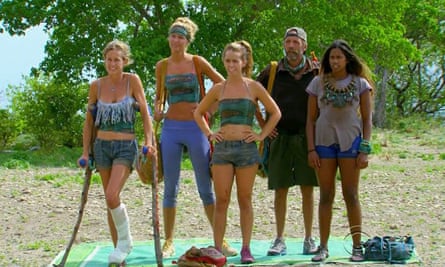
Not only is Survivor still around, it’s still a vital show. Of course it couldn’t sustain the 52 million viewers who tuned into the final of the first season finale in 2000, but this year’s 32nd season finale still clocked almost 10 million, much higher than most shows littering critics Best Of lists at the end of the year.
With that many seasons, of course there have been some duds, but Blood v Water, the show’s 27th season, which pitted family members against one another, was one of its finest. Even at its most humdrum, Survivor is a surprisingly intelligent look at how intricate game design can bring out the best and worst in people, leading to surprising acts of loyalty as well as staggeringly harsh group dynamics. Were it not for Survivor, we wouldn’t have had American Idol, The Voice, Keeping Up with the Kardashians. If it weren’t for Survivor we wouldn’t have had The Apprentice and Donald Trump might not be a stone’s throw from the presidency. So yes, the show that permanently changed the television landscape is still on, and you’re an idiot if you think you can ignore it. Brian Moylan
Clone High
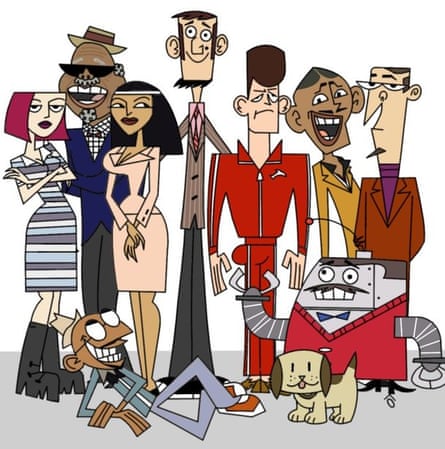
These days Phil Lord and Chris Miller are two of the most in-demand people in Hollywood, the screenwriting duo responsible for the reboot of 21 Jump Street and The Lego Movie. In the early 2000s though, they were merely the creators of Clone High, an anarchic cartoon on MTV that few watched, and fewer remember.
That’s a shame because Clone High was brilliant. Its premise – a shadowy group of government agents make genetic copies of famous historical figures (JFK, Cleopatra, Abe Lincoln) and send them off to high school – should have been too high-concept to work. And yet they managed to turn it into an absurdist send-up of teen dramas, with characters delivering garbled versions of the solemn speeches seen on the likes of The OC and Smallville.
The show had enormous fun too in undermining its famous faces: Lincoln is a perpetual ditherer, Joan of Arc an overly earnest clicktivist type, JFK a lunkheaded jock and Gandhi a party-bro desperately seeking the validation of his peers.
That last gag proved to be Clone High’s undoing. The depiction of Gandhi was deemed offensive by some in India, prompting a mass hunger strike outside MTV’s Delhi offices. Ultimately, it’s hard not to feel that those doing the striking either hadn’t seen the show or had wilfully missed the point – the character isn’t ridiculing Gandhi so much as sending up high-school archetypes – but MTV decided they didn’t need the hassle for a series that wasn’t exactly raking in the viewers, and promptly cancelled it.
Fifteen years on, Clone High exists only via region one DVDs and fuzzy YouTube videos. But Lord and Miller have talked about making a film version, so perhaps this neglected classic may yet have its day in the sun. Gwilym Mumford
Time Trumpet
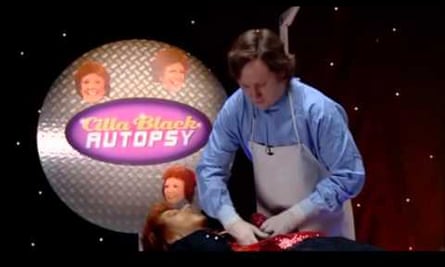
A talking heads nostalgia show set in 2031, Armando Iannucci’s political parody saw comedians including Stewart Lee, Richard Ayoade and Adam Buxton pretend to reminisce about the year 2007 onwards (the series was broadcast in 2006) alongside actors playing future versions of celebrities such as David Beckham, Anne Robinson, Jamie Oliver and Charlotte Church.
In between lampooning TV trends – contributors look back on programmes like June Sarpong’s Donkey Monkey Question Time and Make Me Look Like David Willetts, while Sebastian Coe remembers murdering Justin Lee Collins after finding out the London Olympics were a prank by the Friday Night Project – Iannucci goes in on the political issues of the day.
David Miliband and Charles Clarke remember one unfortunate incident in which the police shot a completely naked man because “they thought he looked like a van packed with explosives”. Tony Blair – still prime minister when Time Trumpet was broadcast – is a “madman” wandering round bins in Baghdad. David Cameron becomes prime minister for 20 days, and is forced to abandon his post after engaging in an unspeakably grotesque act. He leaves parliament in such disarray that the BNP, who have successfully rebranded as an acceptable political party, are able to take power.
Back then, Iannucci was not the comedy behemoth he is now, and the series went largely unreviewed. But, a decade on, it remains one of the most inventive, hilarious and breathtakingly dark television shows of all time, not to mention one of the few satires that has managed to stay stranger than reality – for the time being, at least. Rachel Aroesti
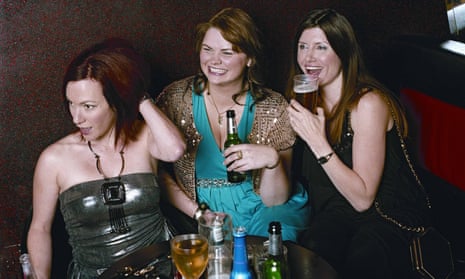
Comments (…)
Sign in or create your Guardian account to join the discussion